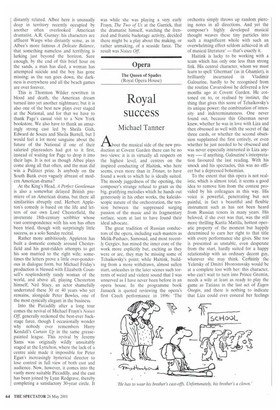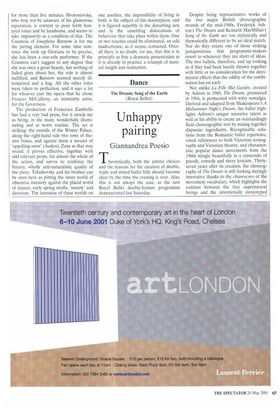Ope r a
The Queen of Spades (Royal Opera House)
Royal success
Michael Tanner
Aaout the musical side of the new production at Covent Garden there can be no two views: it is in virtually all respects on the highest level, and centres on the inspired conducting of Haitink, who here seems, even more than in Tristan, to have found a work to which he is ideally suited. The moody jaggedness of the opening, the composer's strange refusal to grant us the big, gratifying melodies which he hands out generously in his other works, the kaleidoscopic nature of the orchestration, the tension between the suppressed surging passion of the music and its fragmentary surface, seem at last to have found their ideal advocate.
The great tradition of Russian conductors of the opera, including such masters as Melik-Pashaev, Samosud, and most recently Gergiev. has mined the inner core of the work more explicitly but, exciting as they were or are, they may be missing some of Tchaikovsky's point; while Haitink, building from a more withdrawn, almost sullen start, unleashes in the later scenes such torrents of weird and violent sound that I was unnerved as I have never been before in an opera house, In the programme book Janacek is quoted reviewing the opera's first Czech performance in 1896: The orchestra simply throws up random piercing notes in all directions. And yet the composer's highly developed musical thought weaves these tiny particles into such a magnificent whole with such an overwhelming effect seldom achieved in all of musical literature' — that's exactly it.
Haitink is lucky to be working with a team which has only one less than strong link. His central character, whom we must learn to spell `Gherman' (as in Ghamlet), is brilliantly incarnated in Vladimir Galouzine, hardly to be recognised from the routine Cavarodossi he delivered a few months ago at Covent Garden. He cottoned on to, or realised by instinct, the thing that gives this score of Tehaikovsky's its unique power: the combination of intensity and indeterminateness. One never found out, because this Gherman never knew, whether he was in love with Liza and then obsessed as well with the secret of the three cards, or whether the second obsession supplanted the first entirely, or even whether he just needed to be obsessed and was never especially interested in Liza anyway — if anything, Galouzine's interpretation favoured the last reading. With his smock and his spectacles, this was no officer but a depressed bohemian.
To the extent that this opera is not realistic, which is almost total, it seems a good idea to remove him from the context provided by his colleagues in this way. His voice is powerful, penetrating but not painful, in fact a beautiful and flexible instrument such as has not been heard from Russian tenors in many years. His beloved, if she ever was that, was the still more thrilling Karita Mattila, hottest operatic property of the moment but happily determined to earn her right to that title with every performance she gives. She too is presented as unstable, even desperate from the start, hardly suited for a happy relationship with an ordinary decent guy, whatever she may think. Certainly the Yeletsky of Dmitri Hvorostovsky would be at a complete loss with her: this character, who can't wait to turn into Prince Gremin, needs a wife at least as ready to play the game as Tatiana in the last act of Eugen Onegin, and there is nothing to indicate that Liza could ever conceal her feelings for more than five minutes. Hvorostovsky, who may not be unaware of his glamorous reputation, is content to pour forth honeyed tones and be handsome, and seems to take impassivity as a condition of that. The Countess of Josephine Barstow is for me the jarring element. For some time now, since she took up Gloriana to be precise, she has been a one-role performer. If the Countess can't suggest to any degree that she was once a great beauty, has nothing of faded glory about her, the role is almost nullified; and Barstow seemed merely illtempered and a hag. All the other roles were taken to perfection, and it says a lot for whoever cast the opera that he chose Frances McCafferty, an inimitable artist, for the Governess.
The production of Francesca Zambello has had a very bad press, but it struck me as being, in the main, wonderfully illuminating and at worst routine. The set is striking: the outside of the Winter Palace, along the right-hand side two rows of theatre boxes, and against them a mound of 'appalling snow' (Auden). Zany as that may sound. it proves effective, together with odd relevant props. for almost the whole of the action, and serves to reinforce the bizarre, wholly anti-naturalistic quality of the piece. Tchaikovsky and his brother can be seen here as pitting the inner world of obsessive intensity against the placid world of dances, early spring strolls, 'society' and decorum. The intrusion of these worlds on one another, the impossibility of living in both, is the subject of this masterpiece, and it is figured superbly in the disturbing sets and in the unsettling dislocations of behaviour that take place within them. One or two touches could be eliminated, an odd inadvertence, as it seems, corrected. Overall there is no doubt, for me, that this is in principle as fine a dramatic presentation as it is already in practice a triumph of musical insight and realisation.



















































































 Previous page
Previous page